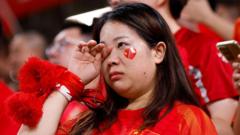On a sweltering night in Saitama, China's national football team suffered a devastating defeat to Japan, losing 7-0. This crushing loss not only marked their worst-ever outcome in a World Cup qualifier but also epitomized the struggles that have haunted Chinese football for years. A mere week later, the scandal deepened when numerous players and officials faced arrests related to corruption, gambling, and match-fixing as part of a two-year investigation scrutinizing the sport's integrity in the country.
Once filled with aspirations of football supremacy, China now finds itself ranked below Curaçao and Luxembourg in FIFA standings. The dream underscored by President Xi Jinping’s wishes to qualify for and ultimately host the World Cup now appears distant. Xi’s enthusiasm for the sport had fueled ambitious plans since he took office in 2012, but years later, he expressed a sense of disbelief in the nation’s abilities during a conversation with a foreign leader.
Experts note that while China can achieve success in sectors like technology and manufacturing under its top-down governance, football requires a grassroots approach that has not been nurtured within the Communist system. Politics infiltrates management, as evidenced by appointments within the Chinese Football Association (CFA) being heavily dictated by party interests rather than footballing credentials. This practice stifles genuine talent development and innovation on the field.
Rowan Simons, an author who has explored Chinese football, succinctly remarked that the failures reflect deeper issues inherent in the nation’s governance. The once-promising passion for the sport is not translating into results, as the talent pool remains distressingly shallow compared to global standards. Notably, England boasts 1.3 million registered players contrasting sharply with the fewer than 100,000 in China.
Despite the difficulty faced by the men’s team, the women’s football squad has consistently performed well, earning respect and admiration for their achievements. However, the tide has turned dramatically since the nation's peak football investment period in the 2010s. This decline has only worsened with the recent economic downturn, leading to a mass exodus of professional clubs reevaluating their operations in an instable financial landscape.
The corruption scandal that shook the sport not only tarnished the reputation of several officials, including the former national team coach Li Tie, who openly confessed to corrupt practices, but it also highlighted systemic weaknesses prevalent in the Chinese football infrastructure. The betrayal echoed throughout the nation's fan base as trust began to erode.
The disparity between China's men’s football fortunes and their successes in other sports like swimming or diving showcases the challenges facing team sports, which thrive on community participation and grassroots support. Observers believe that sustainable success in football demands long-term strategies unimpeded by political interference.
As the nation grapples with these setbacks, the dissatisfaction among fans lingers. Losses, particularly against rivals like Japan and Australia, have prompted mixed reactions; humor mixed with despair reflects the resilience of supporters still hopeful for change. They desire tangible improvement rather than politically-stimulated narratives, underscoring that revitalizing Chinese football hinges primarily on competence over ideology. Football, they lament, requires skill and nurturing, not mere lofty political dreams.



















